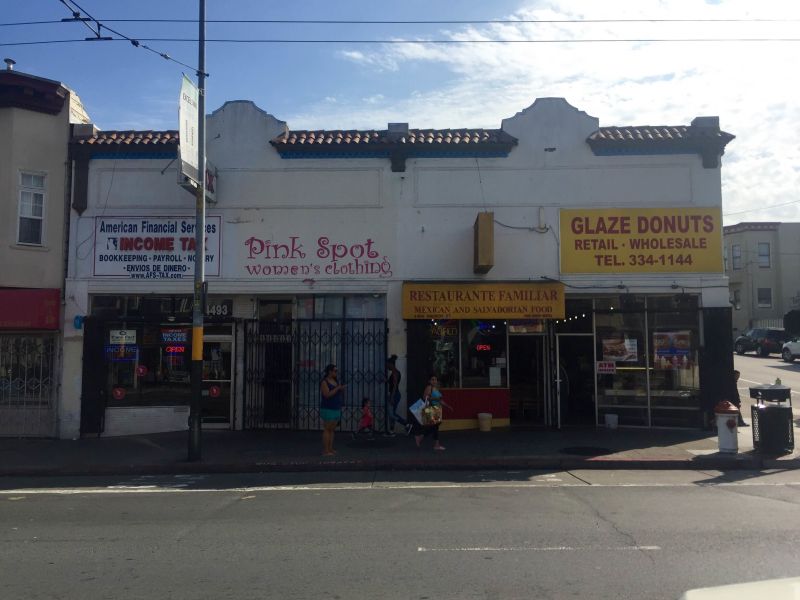Earlier this month, at 2 a.m. Saturday Oct. 3, California Department of Alcoholic Beverage Control agents and San Francisco police officers raided one of the after-hours nightclubs.
In what was only the second ABC raid in the city this year, the authorities entered a small storefront at 4495 Mission St. in the heart of the neighborhood's commercial corridor. Over the door and covered windows still hung the sign of the former tenant, a women's clothing shop called “Pink Spot."
After an undercover ABC agent entered the club and confirmed there were unlicensed alcohol sales, he let in the ABC agents and police to execute a warrant. Forty patrons left as the authorities detained and cited the operators.
“Agents at the scene seized five bottles of distilled spirits, over 1,000 containers of beer and over $800 in cash,” ABC spokesman John Carr said. “The bartender later admitted that the club normally stayed open until 6 a.m.”
The SFPD arrested a man on narcotics charges who allegedly tried to stash in an ice bucket “eleven packets of cocaine packaged for sale," according to a police report. “A search of the suspect’s clothing revealed packets of small denominations of currency totaling more than $1,000.”
The Pink Spot had been serving as a place for patrons of law-abiding bars in the area who did not want to call it quits after last call at 2 a.m. Its clientele was mainly immigrants from south of the border.
ABC had been tipped off by neighbors, receiving complaints regarding loud music, gambling and possible illegal drug activity at the location, and began an investigation, Carr said.
Officers at the nearby Ingleside Police Station also knew about the illegal nightclub.
According to a police incident report obtained by KQED, back in February a man had waved down police officers patrolling Mission Street in the early-morning hours and said that a brawl had occurred inside. Two officers went to the storefront and heard adult voices and music. After they knocked several times, the music stopped, but they were unable to enter and investigate further.
Establishing probable cause, that is obtaining enough evidence to get a warrant, is the most difficult aspect of eliminating illegal activities in storefronts, according to Ingleside Police Station Capt. Joseph McFadden. Without one, law enforcement has to rely on the city attorney to pursue legal action against the property owner. Even then, most of the crimes -- gambling or alcohol sales -- are misdemeanors.
Pete Whitcomb, owner of Pissed Off Pete's, said the Pink Spot was not a problem for his business. "It opens after my bar closes," Whitcomb said.
But there are other issues. "I live a block away and I don't like the riff-raff," Whitcomb said. "It's pretty bad. Our cars are being broken into. There's always something."
Pop-Up Clubs Hard to Track
The Pink Spot nightclub is but one of 10 or so illegal businesses operating in storefronts in his district, McFadden said.
“They're mobile, they're transitory. So if we put heat on them, if we were to send officers by, they're going to shut that one down and move to another location really quickly,” McFadden said.
“Remember, they are run nightly. So if they believe the cops are on to them, they are going to shut down business, move the machines to another location within 24 hours. So that's why it takes time to surveil them and gather the evidence we need.”
Earlier this year, on the same block as the Pink Spot, police investigated a shooting at a cellphone store. Officers discovered the store had a back room where there were a dozen gambling machines. SFPD did not provide an incident report by press time.
It was not long ago that a half-dozen Internet cafes were also open in the neighborhood, where patrons could gamble by way of sweepstakes games through a legal loophole in California law. The City Attorney’s Office was able to shut down the largest offender, Net Stop. Subsequent changes in state law closed the loophole and the other cafes shut down as well.
The Excelsior Action Group, a government-funded nonprofit dedicated to enhancing the neighborhood's commercial corridor, recently performed its quarterly storefront survey and found 38 empty, non-performing or for-sale spaces, up two from the previous survey, on the 1.4-mile stretch of Mission Street it works on.
“The Pink Spot has been a problem for some time,” EAG Executive Director Stephanie Cajina said. “We have been doing corridor walks -- the city attorney, police captains, Outer Mission Merchants and Residents Association and Excelsior Outer Mission Merchants -- and we heard complaints from neighboring bars and other stores.”
Neighbors are already saying they again hear music at the Pink Spot. And there are reports of another after-hours club nearby on Ocean Avenue. Both Cajina and McFadden say they have seen these underground operations advertising on Yelp and Craigslist.
At today's hearing, representatives from the Police Department, building inspection, city attorney, district attorney, Public Works and Planning Departments will be on hand to speak about the current state of affairs and answer questions.
Aside from looking at coordination, successes and planning among city departments, Avalos said, the hearing should show “the rest of City Hall what is happening here in our district, and they need to be aware of what the conditions are for our neighborhoods. And that's something that I deal with every day.”
Avalos said: “How do we recognize the particular, unique needs that we have in this district when much of City Hall is captivated by other district issues, other neighborhood issues where there is a lot of wealth and money being moved around and used to shape what those neighborhoods look like versus ours?”

